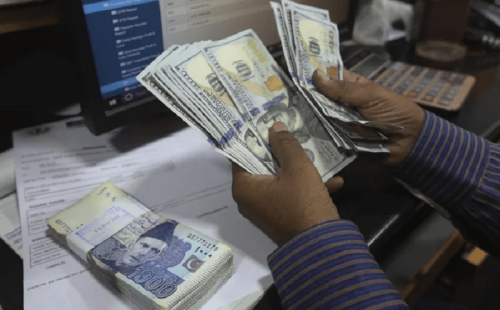—— Says steadfast policy implementation critical for Pakistan
—— Adds the policy implementation vital for programme’s success
—— IMF approved a $3 billion bailout for Pakistan earlier this week
Staff Report
ISLAMABAD: The International Monetary Fund (IMF) has said that Pakistan’s new $3 bil-lion loan programme would anchor the country’s immediate efforts to stabilise the economy and ensure that the current balance of payments need was ful-filled.
Earlier this week, the global lender’s executive board green-lit the nine-month standby arrangement (SBA) in order “to support the authorities’ economic sta-bilisation programme”.
The board approved the bailout package for the country for an amount of $2.25bn Special Drawing Rights (SDRs) — reserve funds that the institution credits to the accounts of its member nations, the IMF had said in a statement, adding that this amounts to about $3bn, or 111 per cent of Pakistan’s quota.
Subsequently, Finance Minister Ishaq Dar said the first tranche of $1.2 bil-lion was deposited in the central bank, while the “balance amount” of $1.8bn would be handed over after two reviews in November and February. In a press briefing on Thursday, IMF spokesperson Julie Kozack said the SBA came at a “challenging juncture”.
The programme, she stated, was aimed at supporting the government’s eco-nomic stabilisation plan and policies, with due protection for the most vulner-able, and providing a framework for financing from multilateral and bilateral partners.
The spokesperson stressed that “steadfast policy implementation” was critical in the period ahead. “This will be critical for the success of the programme and, of course, ultimately, for aiding and supporting the people of Pakistan,” she added.
Kozack went on to say that programme, although short, would ensure that Pa-kistan’s current balance of payments need was fulfilled.
“While it is a relatively short programme, it provides time for Pakistan to im-plement policies critical to strengthening its domestic external economic situation, thereby supporting sustainability.
“Of course, resolving Pakistan’s structural challenges will likely require contin-ued reforms over the medium term to underpin the needed economic trans-formations, to strengthen inclusive growth prospects, and to create an envi-ronment conducive to renewed private capital inflows,” she stated.
The spokesperson also assured that the IMF was always standing ready to work with the country and the government in efforts to restore sustainability and economic stability.
Another $5.6 bn in funding
Meanwhile, Pakistan is set to draw in $5.6 billion in additional financ-ing, Bloomberg News reported.
The new funding will include $3.7 billion of commitments from bilateral part-ners including Saudi Arabia and the United Arab Emirates, said Nathan Porter, the IMF’s mission chief for Pakistan.
‘A breather’
The IMF programme comes as a relief for the cash-starved nation and has strengthened the rupee and the stock market.
Earlier today, the business community believed the approval of the nine-month arrangement would end a long-drawn-out period of economic uncer-tainty and volatility.
Federation of Pakistan Chambers of Commerce and Industry (FPCCI) Presi-dent Irfan Iqbal Sheikh said securing the IMF programme was indispensable at this critical juncture of the country’s economic history.
He said despite being tough on trade and industry, the businessmen were wel-coming the IMF bailout programme in the greater national interest as it would open up inflows of external funding from bilateral, multilateral and interna-tional institutional sources.
Meanwhile, Korangi Association of Trade and Industry President Faraz-ur-Rehman urged the government to seize this opportunity to implement con-crete measures aimed at improving the economy and expanding the tax base.
He believed that the IMF programme would bring economic stability and en-hance the fiscal capacity of the government.
However, it is termed as the SBA a “breather”.
“It gives us a few stable months to conduct the elections and service external debt over the next six months but doesn’t really change the fundamentals of the economy such as insufficient tax revenues, low exports, import-based con-sumption, and so on.
“However, it can help us get back on our feet if we use this ‘breather’ as a bridge to broad-based reforms for longer-term debt sustainability and growth. We’re in the deepest ever crisis of our own making and living on borrowed money and time,” it added.




